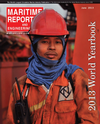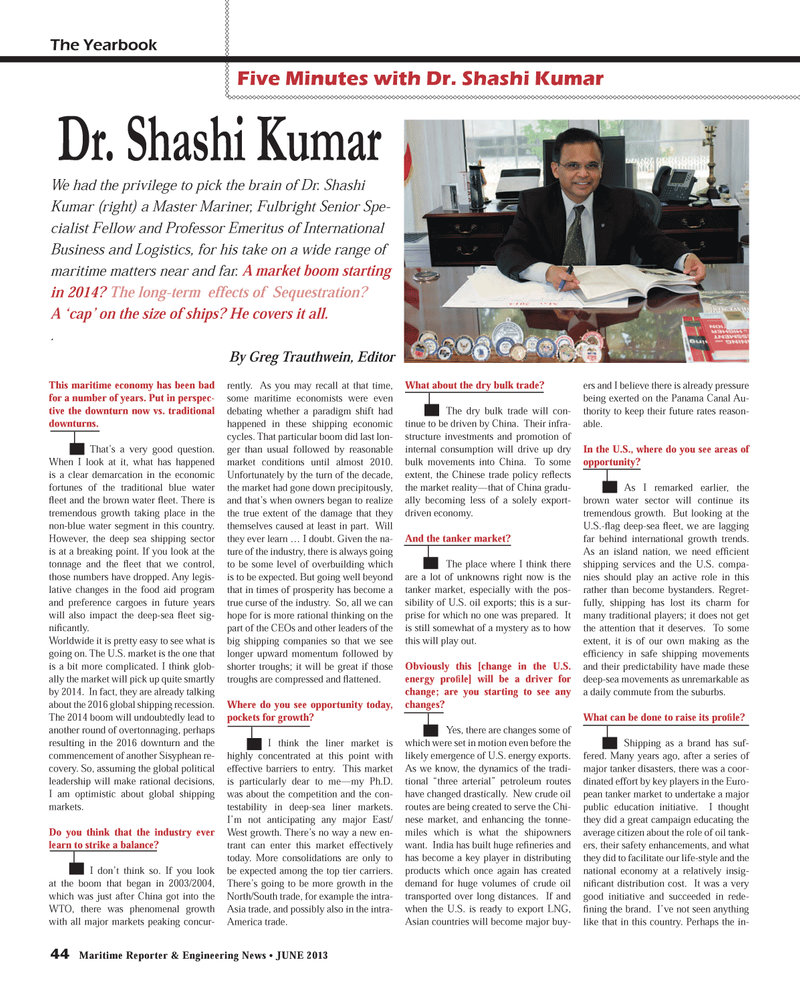
Page 44: of Maritime Reporter Magazine (June 2013)
Annual World Yearbook
Read this page in Pdf, Flash or Html5 edition of June 2013 Maritime Reporter Magazine
44 Maritime Reporter & Engineering News ? JUNE 2013 This maritime economy has been bad for a number of years. Put in perspec- tive the downturn now vs. traditional downturns. That?s a very good question. When I look at it, what has happened is a clear demarcation in the economic fortunes of the traditional blue water ß eet and the brown water ß eet. There is tremendous growth taking place in the non-blue water segment in this country. However, the deep sea shipping sector is at a breaking point. If you look at the tonnage and the ß eet that we control, those numbers have dropped. Any legis- lative changes in the food aid program and preference cargoes in future years will also impact the deep-sea ß eet sig- niÞ cantly. Worldwide it is pretty easy to see what is going on. The U.S. market is the one that is a bit more complicated. I think glob-ally the market will pick up quite smartly by 2014. In fact, they are already talking about the 2016 global shipping recession. The 2014 boom will undoubtedly lead to another round of overtonnaging, perhaps resulting in the 2016 downturn and the commencement of another Sisyphean re-covery. So, assuming the global political leadership will make rational decisions, I am optimistic about global shipping markets. Do you think that the industry ever learn to strike a balance? I don?t think so. If you look at the boom that began in 2003/2004, which was just after China got into the WTO, there was phenomenal growth with all major markets peaking concur- rently. As you may recall at that time, some maritime economists were even debating whether a paradigm shift had happened in these shipping economic cycles. That particular boom did last lon- ger than usual followed by reasonable market conditions until almost 2010. Unfortunately by the turn of the decade, the market had gone down precipitously, and that?s when owners began to realize the true extent of the damage that they themselves caused at least in part. Will they ever learn ? I doubt. Given the na-ture of the industry, there is always going to be some level of overbuilding which is to be expected. But going well beyond that in times of prosperity has become a true curse of the industry. So, all we can hope for is more rational thinking on the part of the CEOs and other leaders of the big shipping companies so that we see longer upward momentum followed by shorter troughs; it will be great if those troughs are compressed and ß attened.Where do you see opportunity today, pockets for growth? I think the liner market is highly concentrated at this point with effective barriers to entry. This market is particularly dear to me?my Ph.D. was about the competition and the con-testability in deep-sea liner markets. I?m not anticipating any major East/West growth. There?s no way a new en- trant can enter this market effectively today. More consolidations are only to be expected among the top tier carriers. There?s going to be more growth in the North/South trade, for example the intra-Asia trade, and possibly also in the intra-America trade. What about the dry bulk trade? The dry bulk trade will con- tinue to be driven by China. Their infra-structure investments and promotion of internal consumption will drive up dry bulk movements into China. To some extent, the Chinese trade policy reß ects the market reality?that of China gradu-ally becoming less of a solely export-driven economy. And the tanker market? The place where I think there are a lot of unknowns right now is the tanker market, especially with the pos-sibility of U.S. oil exports; this is a sur-prise for which no one was prepared. It is still somewhat of a mystery as to how this will play out. Obviously this [change in the U.S. energy proÞ le] will be a driver for change; are you starting to see any changes? Yes, there are changes some of which were set in motion even before the likely emergence of U.S. energy exports. As we know, the dynamics of the tradi- tional ?three arterial? petroleum routes have changed drastically. New crude oil routes are being created to serve the Chi-nese market, and enhancing the tonne-miles which is what the shipowners want. India has built huge reÞ neries and has become a key player in distributing products which once again has created demand for huge volumes of crude oil transported over long distances. If and when the U.S. is ready to export LNG, Asian countries will become major buy-ers and I believe there is already pressure being exerted on the Panama Canal Au- thority to keep their future rates reason-able.In the U.S., where do you see areas of opportunity? As I remarked earlier, the brown water sector will continue its tremendous growth. But looking at the U.S.-ß ag deep-sea ß eet, we are lagging far behind international growth trends. As an island nation, we need efÞ cient shipping services and the U.S. compa-nies should play an active role in this rather than become bystanders. Regret-fully, shipping has lost its charm for many traditional players; it does not get the attention that it deserves. To some extent, it is of our own making as the efÞ ciency in safe shipping movements and their predictability have made these deep-sea movements as unremarkable as a daily commute from the suburbs.What can be done to raise its pro Þ le? Shipping as a brand has suf- fered. Many years ago, after a series of major tanker disasters, there was a coor-dinated effort by key players in the Euro- pean tanker market to undertake a major public education initiative. I thought they did a great campaign educating the average citizen about the role of oil tank-ers, their safety enhancements, and what they did to facilitate our life-style and the national economy at a relatively insig-niÞ cant distribution cost. It was a very good initiative and succeeded in rede-Þ ning the brand. I?ve not seen anything like that in this country. Perhaps the in- Dr. Shashi Kumar We had the privilege to pick the brain of Dr. Shashi Kumar (right) a Master Mariner, Fulbright Senior Spe- cialist Fellow and Professor Emeritus of International Business and Logistics, for his take on a wide range of maritime matters near and far. A market boom starting in 2014? The long-term effects of Sequestration? A ?cap? on the size of ships? He covers it all. . By Greg Trauthwein, Editor The YearbookFive Minutes with Dr. Shashi KumarMR #6 (42-49).indd 44MR #6 (42-49).indd 445/31/2013 9:10:57 AM5/31/2013 9:10:57 AM

 43
43

 45
45
